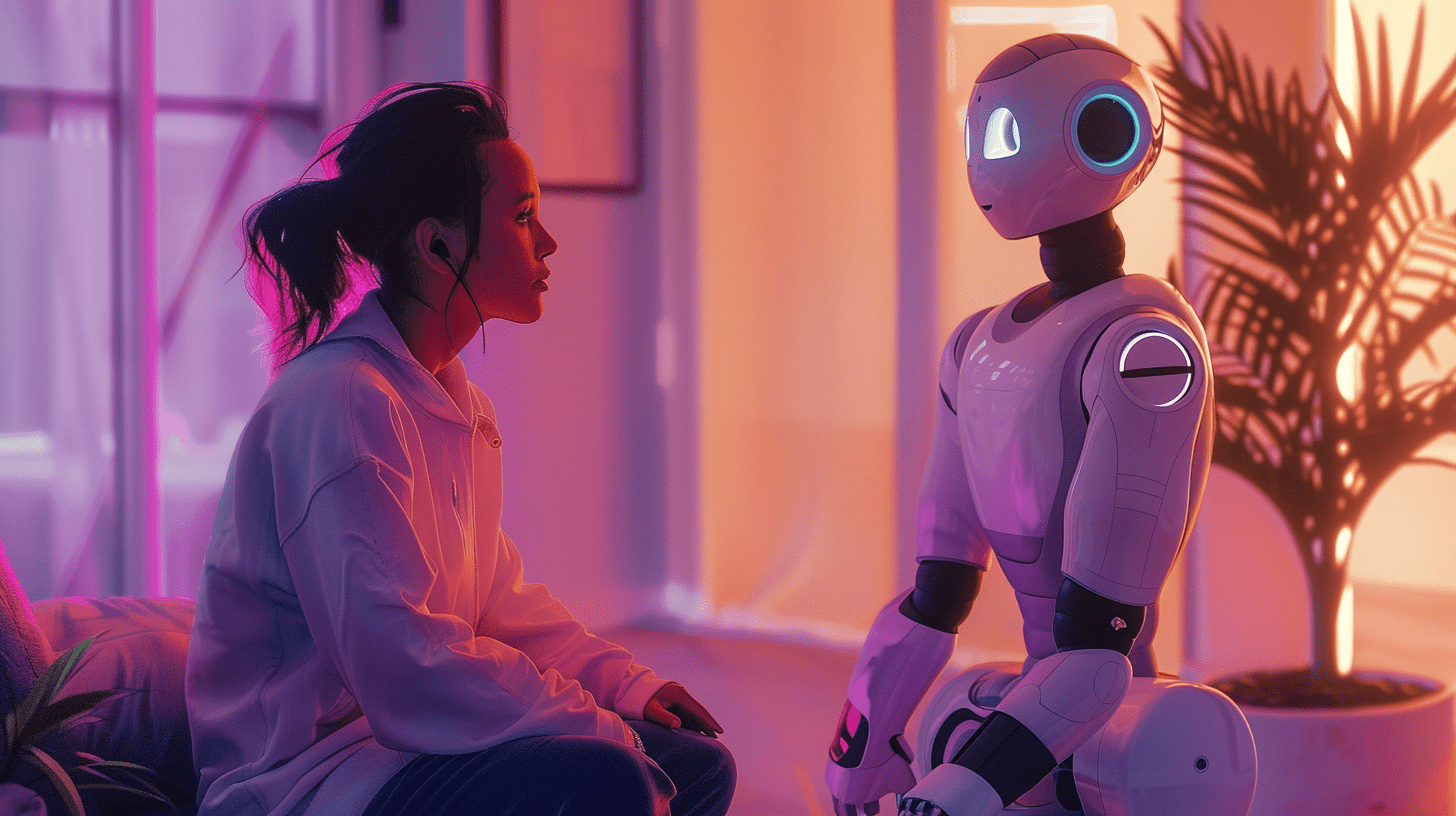Discover how AI Therapy is leading the way in revolutionizing mental health. Meet your new AI Therapist and find affordable, convenient support 24/7.
Table of Contents
- How Does AI Therapy Work Exactly?
- Benefits of AI Therapy Chatbots
- AI Therapist as Cost-Effective help
- AI Therapist as a help for relationship issues
- Challenges of AI Therapy Chatbots
- 5 Popular AI Therapy Chatbots to Know
- Conclusion
How Does AI Therapy Work Exactly?
Artificial intelligence (AI) therapy is a relatively new approach to mental health treatment that utilizes cutting-edge technology to provide personalized and efficient support to individuals struggling with various psychological issues. But how exactly does AI therapy work?
AI therapy typically involves the use of chatbots or virtual assistants that are programmed to interact with users in a way that mimics human conversation. These chatbots are capable of analyzing the user's input and providing appropriate responses, offering support, guidance, and coping strategies based on the user's unique needs and goals.
One of the key advantages of AI therapy is its accessibility and convenience. Users can access therapy sessions at any time and from anywhere, without the need for an in-person appointment with a therapist. This can be particularly helpful for individuals who may have difficulty accessing traditional therapy due to cost, stigma, or logistical barriers.
Additionally, AI therapy can offer a consistent level of support and monitoring that may not be possible with traditional therapy. Chatbots can check in with users regularly, track their progress, and adjust their support based on changes in the user's symptoms or needs. This level of personalization can help users feel more engaged and motivated to continue their treatment.
AI therapy can also offer a level of anonymity and privacy that may be appealing to some individuals. Users can feel more comfortable opening up to a chatbot than they would to a human therapist, reducing the fear of judgment or stigma that can sometimes accompany traditional therapy.
However, it is important to note that AI therapy is not a replacement for traditional therapy, particularly for individuals with severe or complex mental health issues. While AI therapy can provide valuable support and guidance, it may not be able to offer the same level of insight, empathy, and understanding that a human therapist can provide.
Overall, AI therapy is a promising new approach to mental health treatment that has the potential to reach and support a larger number of individuals in need. By leveraging technology to provide personalized and convenient support, AI therapy can help individuals improve their mental well-being and lead happier, healthier lives.
Is AI Therapy Effective?
AI therapy, also known as artificial intelligence therapy, is an innovative approach to mental health care that harnesses the power of technology to provide support and treatment to individuals in need. While the concept of AI therapy may sound impersonal or lacking in human touch, many studies have shown that it can be an effective tool for managing and improving mental health.
One of the key benefits of AI therapy is its accessibility. With traditional therapy, individuals may face barriers such as high costs, long wait times, or stigma associated with seeking help. AI therapy can be accessed from the comfort of one's home, at any time of day or night, making it a convenient option for those who may have difficulty accessing traditional therapy services.
Additionally, AI therapy can provide personalized support tailored to the individual's specific needs. Through the use of algorithms and machine learning, AI therapy platforms can analyze data and provide targeted interventions to address a person's unique mental health concerns. This level of personalization can lead to more effective outcomes compared to one-size-fits-all approaches used in traditional therapy.
Several studies have found AI therapy to be effective in treating a variety of mental health issues, including depression, anxiety, and PTSD. For example, a study published in the Journal of Medical Internet Research found that a chatbot program called Woebot was effective in reducing symptoms of depression and anxiety in young adults. Another study published in the Journal of Affective Disorders found that an AI therapy program called Wysa was effective in reducing symptoms of depression and improving overall well-being in individuals with mild to moderate depression.
While AI therapy has shown promise in improving mental health outcomes, it is important to note that it is not meant to replace traditional therapy completely. Instead, AI therapy should be seen as a complementary tool that can augment and support traditional therapy services. Some individuals may still benefit from the human connection and support provided by a therapist, while others may find that AI therapy is a more convenient and effective option for their needs.
In conclusion, AI therapy has the potential to revolutionize the field of mental health care by providing personalized, accessible, and effective support to individuals in need. While more research is needed to further understand its effectiveness, the current evidence suggests that AI therapy can be a valuable tool in improving mental health outcomes for many individuals. Ultimately, the effectiveness of AI therapy will depend on the individual and their unique needs and preferences, but it is clear that this innovative approach has the potential to make a significant impact on the field of mental health care.

Benefits of AI Therapy Chatbots
In recent years, the use of artificial intelligence (AI) therapy chatbots has gained momentum as a form of mental health support. These virtual assistants are programmed to simulate human conversation and provide emotional support, guidance, and resources to individuals in need. While they are not meant to replace traditional therapy, AI therapy chatbots offer several benefits that can complement and enhance mental health treatment.
One of the key benefits of AI therapy chatbots is accessibility. Many people struggle to access mental health services due to long waitlists, high costs, or stigma surrounding therapy. AI therapy chatbots provide an alternative option for those who may not be able to seek help from a therapist in person. These chatbots are available 24/7, allowing individuals to receive support whenever they need it, and from the comfort of their own home.
Another advantage of AI therapy chatbots is their ability to reach a wider audience. These virtual assistants can provide support to individuals in remote areas or those who speak languages that are not widely supported in traditional therapy settings. Additionally, AI therapy chatbots can reach out to individuals who may not be aware of or able to access mental health resources on their own.
AI therapy chatbots also offer a level of anonymity that some people may find comforting. Individuals struggling with mental health issues may be hesitant to seek help due to fear of judgment or privacy concerns. AI chatbots provide a safe space for individuals to discuss their feelings and receive support without the fear of being stigmatized.
Furthermore, AI therapy chatbots can provide consistent support to individuals over time. These virtual assistants can track a user's progress, provide reminders for self-care activities, and offer coping strategies tailored to the individual's needs. This continuous support can help individuals better manage their mental health and develop healthy habits for long-term well-being.
Overall, AI therapy chatbots offer a convenient, accessible, and effective form of mental health support for individuals in need. While they are not a replacement for traditional therapy, AI chatbots can complement existing mental health services and provide valuable support to those struggling with their mental health. As technology continues to advance, AI therapy chatbots have the potential to play a significant role in improving mental health outcomes for individuals around the world.
No Wait Times
AI therapy chatbots are revolutionizing the mental health industry by providing immediate access to support and guidance without the need to wait for appointments. This technology offers a multitude of benefits for those seeking help.
Immediate Assistance
One of the key advantages of AI therapy chatbots is the ability to provide immediate support to individuals in distress. Rather than having to wait weeks or even months for an appointment with a therapist, users can access a chatbot at any time of day or night and receive real-time guidance and advice.
24/7 Availability
AI therapy chatbots are available 24 hours a day, seven days a week, making them a convenient option for individuals who are unable to access traditional therapy services during regular business hours. This around-the-clock availability ensures that users can receive help whenever they need it, regardless of their schedule or time zone.
AI Therapist as Cost-Effective help
Traditional therapy sessions can be expensive, with costs adding up over time. AI therapy chatbots offer a cost-effective alternative, as many are available for free or at a fraction of the cost of traditional therapy sessions. This makes mental health support more accessible to individuals who may not have the financial means to seek help through traditional channels.
AI Therapist platform for Anonymity
Some individuals may feel uncomfortable discussing their mental health issues with a therapist in person. AI therapy chatbots offer a level of anonymity that can help users feel more comfortable opening up about their struggles. This anonymity can encourage individuals to seek help earlier and more frequently, leading to improved mental well-being.
Personalized Support:
AI therapy chatbots are equipped with algorithms that analyze users' responses and provide personalized support and guidance based on their individual needs. This personalized approach can help users feel understood and supported, leading to more effective therapy outcomes.
Overall, AI therapy chatbots offer a range of benefits for individuals seeking mental health support, including immediate assistance. This technology is helping to bridge the gap between individuals in need of help and traditional therapy services, making mental health support more accessible and efficient.
AI Therapist as Non-Judgmental platform for health care
Artificial Intelligence (AI) technology continues to revolutionize various industries, and one area where it is making a significant impact is in the field of mental health care. AI therapists are becoming increasingly popular as a non-judgmental and unbiased platform for individuals seeking therapeutic help. and with common mental health conditions.
Traditional therapy involves seeking help from a human therapist, who may bring their own biases and judgments into the therapeutic relationship. However, AI therapists (chatgpt) offer a unique advantage by providing a neutral and non-judgmental space for individuals to express their thoughts and feelings without fear of being criticized or misunderstood.
AI therapists are programmed to respond to users' statements and questions with empathy and understanding, without imparting their own opinions or personal experiences. This allows individuals to freely discuss their feelings and concerns without feeling like they are being judged or scrutinized.
Furthermore, AI therapists are available 24/7, allowing individuals to access support whenever they need it, without having to wait for an appointment with a human therapist. This can be particularly beneficial for individuals experiencing crises or acute mental health issues.
Another benefit of AI therapists is their ability to collect and analyze data from user interactions, providing insights into users' mental health and helping them track their progress over time. This data can be valuable for both the individual and their human therapist, if they choose to seek additional support from a professional.
While AI therapists are not a replacement for human therapists, they can serve as a valuable supplement to traditional therapy. They provide a safe and non-judgmental space for individuals to explore their thoughts and feelings, and can offer support and guidance in a convenient and accessible manner.
As technology continues to advance, AI therapists are likely to become more sophisticated and effective in helping individuals improve their mental health. Of course AI is not a psychotherapist but it offers lot of tools and levels for improving health care. They offer a promising solution for individuals who may be hesitant to seek help from a human therapist, and provide a valuable resource for improving mental health and well-being.
AI Therapist as a help for relationship issues
Relationship issues are a common reason why people seek therapy, as they can significantly impact a person's emotional well-being and overall quality of life. AI therapists offer a unique solution to this problem by providing accessible and affordable mental health support to individuals who may not have access to traditional therapy or prefer the anonymity of a virtual platform. People with anxiety issues or any another attachment style issues.
One of the key advantages of using an AI therapist for relationship issues is the convenience and flexibility it offers. Individuals can access the therapy at any time and from any location, making it easier to fit into their busy schedules. This can be particularly beneficial for individuals who are hesitant to seek traditional therapy due to stigma or logistical constraints.
Another advantage of AI therapists is their ability to provide personalized feedback and support based on the individual's specific needs and preferences. Through natural language processing and machine learning algorithms, AI therapists can analyze the user's speech patterns, emotions, and responses to tailor their responses accordingly. This level of personalization can help individuals feel understood and supported, leading to more effective therapy outcomes.
Research has shown that AI therapists can be just as effective as traditional therapy in addressing a variety of mental health issues, including relationship problems. A study published in the Journal of Medical Internet Research found that individuals who used an AI therapist for relationship issues reported significant improvements in their mental health and overall well-being.
However, it is important to note that AI therapists are not meant to replace traditional therapy or human therapists entirely. They can be a valuable supplement to traditional therapy or a temporary solution for individuals who are unable to access traditional therapy. It is also crucial to ensure that AI therapists are developed ethically and with consideration for user privacy and confidentiality.
Challenges of AI Therapy Chatbots
Artificial Intelligence (AI) therapy chatbots have emerged as promising tools for providing mental health support. These digital assistants leverage advanced machine learning algorithms to simulate human-like conversations and offer therapeutic interventions. Despite their potential, AI therapy chatbots face several significant challenges that impact their effectiveness and reliability.
Lack of Emotional Intelligence
One of the primary challenges of AI therapy chatbots is their inability to fully understand and respond to human emotions. While these bots can recognize certain emotional cues based on textual inputs, they often lack the nuanced understanding that a human therapist possesses. This limitation can lead to inappropriate or insufficient responses, potentially exacerbating a user's emotional state rather than alleviating it.
Ethical and Privacy Concerns
The use of AI in therapy raises substantial ethical and privacy issues. Users share sensitive personal information with these chatbots, and there is always a risk of data breaches or misuse. Ensuring the confidentiality and security of users' data is paramount, yet difficult to guarantee. Furthermore, ethical concerns arise regarding the AI's decision-making processes and the potential for bias in the responses generated by the algorithms.
Limited Scope of Intervention
AI therapy chatbots are typically programmed to handle common mental health issues like anxiety and depression. However, their ability to address more complex psychological conditions is limited. Unlike human therapists who can adapt their methods based on the patient's evolving needs, chatbots follow pre-set algorithms that may not be flexible enough to manage intricate or severe mental health issues effectively.
User Engagement and Trust
Building user engagement and trust is another significant challenge. For therapy to be effective, users need to feel comfortable and trust their therapist. Many individuals are skeptical about sharing personal struggles with a machine, fearing judgment or misunderstanding. The lack of a personal touch and the impersonal nature of AI can hinder the development of a therapeutic alliance, which is crucial for successful outcomes in therapy.
Regulatory and Standardization Issues
The regulatory landscape for AI therapy chatbots is still evolving. There is a lack of standardized guidelines and protocols for their development and deployment. This regulatory uncertainty can lead to variations in the quality and safety of these tools. Ensuring that AI therapy chatbots meet specific standards and are regularly updated and evaluated is essential to maintain their credibility and effectiveness.
Dependence on Quality Data
AI therapy chatbots rely heavily on the quality of the data they are trained on. If the training data is biased or not representative of the diverse user population, the chatbot's responses can be flawed and discriminatory. Continuous improvement and updating of the training datasets are required to enhance the chatbot's accuracy and relevance to various users.
5 Popular AI Therapy Chatbots to Know
1. Woebot: Woebot is an AI-driven digital companion that uses principles of Cognitive Behavioral Therapy (CBT) to help users manage mental health issues like anxiety, depression, and stress. Woebot engages users in chat-based conversations, offering modules on various topics such as self-care, relationships, and stress management. However, its interactions can sometimes feel limited compared to human therapy, as users often select from pre-determined responses rather than freely expressing themselves
2. Mindset AI: Relationship Coach : Relationship Coach is an app designed to support users in navigating various relationship dynamics and improving their mental well-being. Developed by Somabrain Oy, this app employs AI-based coaching techniques to provide personalized guidance and support for managing relationships, whether romantic, familial, or self-focused.
Key features of Mindset AI include:
-
24/7 Anonymous Support: The app offers a confidential space for users to discuss their issues without fear of judgment. This feature is designed to provide immediate emotional support and anxiety relief.
-
Therapeutic Techniques: Mindset AI integrates several therapeutic methods, including Cognitive Behavioral Therapy (CBT), Dialectical Behavior Therapy (DBT), and somatic work. These tools help users regulate emotions, identify negative thought patterns, and address trauma.
-
Communication and Action Strategies: The app helps users improve their communication skills and provides actionable advice tailored to individual circumstances, enhancing their ability to navigate daily challenges.
-
Specialized Chat Channels: These channels focus on specific relationship dynamics such as romantic relationships, parenting, and inner child work. Each channel is designed to provide targeted support and strategies for dealing with particular issues.
Subscription Options: Mindset AI offers a subscription model with a free trial period. Users can choose between a monthly or annual subscription, with the latter providing a discount.Mindset AI is praised for its user-friendly interface and the depth of its therapeutic content, making it a useful tool for those looking to enhance their relationships and overall mental health (Apple) (Mindset AI)
3. Youper: Youper combines AI with human support, offering a personalized chatbot for emotional assistance. It utilizes evidence-based techniques from CBT to help users understand and manage their emotions. Youper's goal is to make therapy more accessible and affordable, allowing users to engage in self-improvement and mental health management through conversational agents
4. 7 Cups: 7 Cups provides online therapy and emotional support through volunteer listeners and licensed therapists. The platform offers several plans, including a free plan with limited daily chats and premium plans that offer more extensive support, including unlimited messaging and weekly therapy sessions. 7 Cups aims to provide immediate support and a safe space for users to discuss their mental health challenges
5. Meomind: Meomind offers a unique approach by providing access to pre-recorded therapy sessions on a variety of topics. This allows users to experience therapy at their own pace and convenience. The sessions are evidence-based and quality-controlled, making therapy more scalable and accessible. Meomind also hosts live events to support users further
Conclusion
In conclusion, AI therapist platforms have the potential to revolutionize mental health services by increasing accessibility, personalized treatment options, and reducing stigma associated with seeking help. While they may not replace traditional therapy entirely, they can complement existing services and reach individuals who may not otherwise have access to care. As these platforms continue to evolve and improve, it is important to prioritize ethical considerations, privacy protections, and ongoing research to ensure their effectiveness and safety for users. Overall, AI therapist platforms hold great promise in improving mental health outcomes and bringing support to those in need.




